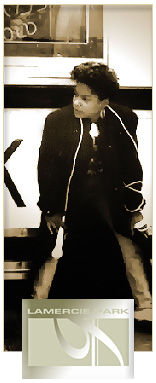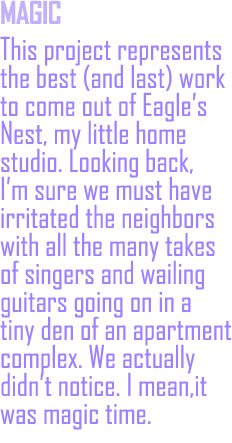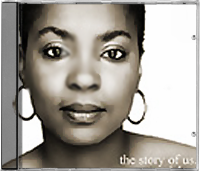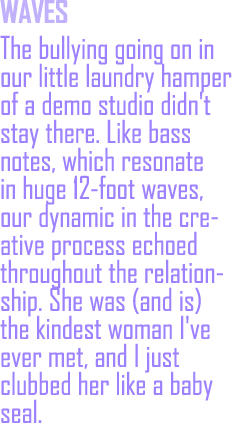
Wake The Neighbors
Well, this was it. Whatever level of professionalism or glory my
little Pizza Hut of a recording studio ever achieved was
achieved through this project. Having pretty much abandoned my
own pursuit of a career in music, I nevertheless began dating
and eventually married someone whose musical dreams were still
intact. So, me being me, I painted an "S" on my chest and dug
in, obsessively determined to make someone else's dream come
true. Only, as men tend to do, I was falling into the trap of
trying to be a problem solver. Women don't necessarily want men
to solve their problems for them. They want us to listen, to
empathize and to understand. At that point in my life, I wasn't
well-practiced in any of those disciplines.
This project represents four years of investment and very hard
work. It is the best (and last) work to come out of
Eagle’s Nest, my little home studio. It's kind of impossible to
omit it from any review of who or what I was and, frankly, it's
pretty unfair to even ask me to do so. I presume memories, much like photographs
or, in this case, recording masters, should be considered
community property in a divorce. Older
and, God willing, more mature than the man I once was, I am
normally happy to agree to whatever terms of surrender there
are. Still, in this 2013 rebuild of these pages, I've
chosen to keep this collection intact. Looking back, I’m sure we
must have irritated the neighbors with all the many takes of
singers and wailing guitars going on in a tiny den of an
apartment complex. We actually didn’t notice. I mean, it was
magic time.
Faith
After some miscues, Yanick and I began dating, I think, in
the fall of 1988. Hollis Stone’s slow and cancerous death began
in March of 1989 when I began working on Yanick’s demo. Our
marriage ended the summer of 1993, maybe two or so months after
the finished press kits arrived. This is very much The Story of
Us; this
work is the best my little demo studio ever got, the strongest
writing and best playing from real musicians and singers Yanick
and I recruited to up our game in the studio. I am extremely
proud of this work, though much of it may sound awfully 1989.
Considering we had very little to work with— a 4-track Tascam
246 PortaStudio and a few effects processors— this stuff is a
minor miracle.
I gave Yanick my very best. I gave her absolutely everything and
every creative impulse I knew. Yanick and I worked very hard on this
and, for the most part, had a great time doing it. It was a great time of life,
and the work crackles with energy and enthusiasm. This stuff was
the crowning and final achievement of Hollis Stone's career, and
I'm quite satisfied with that.
Yanick was and remains the kindest human being I’ve ever met. Generous to a
fault and possessed of an almost ethereal grace and innocence.
Anointed. The rarest of rarities, an intelligent and
sophisticated woman who still possessed a childlike innocence
and sense of wonder. Possibly the most noble soul I have ever
known. She drew me out of my darkness. This was a person who routinely ran herself ragged
giving and doing things for others. She was annoyingly kind and
generous and she was the most warm and loving woman I have ever
known. In fact, I could truly find fault with her only in the
studio, where her ambition, drive, singularity of focus and
strength of will made me want to choke her (and her me) on many
occasions. But, this was a person who put up with me for five
years, who taught me what real love was, and who shaped my life
forever.
Gregg Sullivan, a wonderful guitarist I
believe Glen Alexander turned me on to, works with Yanick on the
most inexplicable, most ridiculous song I’ve ever written,
I
Know You Don’t Believe. What makes the song ridiculous is the
song was written about our relationship; my sense of her lack of
faith in me. The Apostle Paul teaches us not to be unevenly
yoked with non-believers [2 Corinthians 6:14]. Today, as a
pastor, I'd apply that scripture beyond the spiritual imperative
to advise you to not be unevenly yoked to anyone who does not
believe in you; who does not fully embrace all that you are.
It's hard to live on faith, the song says, I would be
stronger with someone in my corner. Had she written that for
me, it would prompt one of my famous bouts of paranoia,
self-recrimination and doubt. It is not a benign ballad but a
cry for help from someone completely invested in someone else's
dream.
I wanted to impress her.
I wrote largely about us, about who we were. Having known her
since high school, having seen her through many relationships, I’d hoped this time things would be different for
her and for us.
This Time grew out of that idea, and that song
became her signature. I wanted a big sound, the best and
crowning achievement of my little 4-track history. By then I’d
truly mastered my little recording studio and knew I could get a
good sound out of the gear. I was king of my particular donut
shop. Donut Emperor.
I wanted players, real players, not just me. I was hanging
around with a colorful guy named Johnmark Brown who was working
on and off with a bassist named Derek Jackson. I called Glen
Alexander, but he was touring and unavailable. I think he passed
on Gregg Sullivan’s number, and Gregg signed on as our guitarist. Johnmark recruited a couple of his singers, the
amazing Bridget Shorter (that soaring first soprano on Reflex)
and Rita Hurt, to sing with Yanick and myself. Johnmark and I
arranged the vocals and, if you listen closely, you’ll hear some
wonderfully understated harmonies. It was ambitious. There were
no sequencers. The piano sound really sucked. It was a really,
really good song. Yanick, however, was not quite ready to sing
it. We recorded several takes over the next four years, before
arriving at a truly inspired one in early 1993. The version
included here is, I believe, an earlier take; I no longer have
masters of the final version.
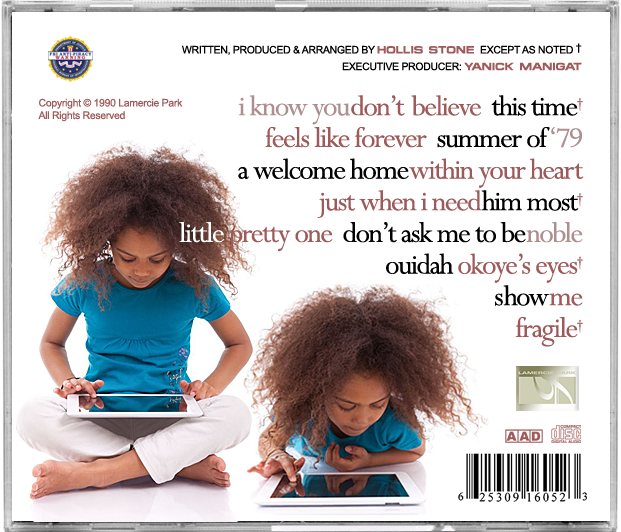
Nights & Days
On the
heels of This Time, I wanted to do something much simpler. This
yielded Yanick’s other signature song,
Feels Like Forever, a
melancholy, half-hearted “love” ballad that, to me, summed up
her tentative, conflicted passion for me. Nothing on Yanick’s
project sounded happy or cheerful. It was all this hollow
ringing of a bell.
Here, Derek and Gregg (who never met before 1993's
Covenant Live project) finally clicked into a real team. A
gorgeous, exhilarating bit of pop structure with me playing
understated stay-out-of-harm’s-way FM piano pads under
Gregg’s breezy guitar parts. I twisted Yanick’s arm into getting
her twin sister, Florence, to sing on the track, to recapture
some of the lithe resonance from Chapter 1’s Sorry To Say, and I
coaxed Yanick into belting out a diva-like oration at the tail
end of the song.
She browbeat me during the mix to turn Derek's bass up,
something I didn't want to do. In those days, we tended to mix
the bass behind the kick drum as opposed to in front of it. In
retrospect, she was right: Derek's fluid, hypnotic bass lines
present much better in front of the kick, and now I wish I'd
mixed all of the tracks that way.
In retrospect: I bullied Yanick a lot on this project. I was
used to Bonita kind of bouncing into the studio, doing whatever
I asked--improving it in many ways--and then turning cartwheels
in the parking lot as we headed off for post-session ice cream.
There was zero sexual tension between us. I was also used to bassist Derek Jackson
openly mocking my incompetence, snickering, "I don't have to
play it that way, do I?" before proceeding to rip my head
off with his amazing gift. In the end, Derek gave me what I
wanted; his purpose in being there, in starting his car to drive
over, was to achieve the goal I'd set.
Yanick, a creative person in her own right, challenged most
creative choices. My speculation is the album Yanick wanted to
make might have had wistful little folk ditties and lots of
cabasa shaking, maybe some lutes. I was channeling Anita Baker.
I was prepared to irritate, manipulate, or otherwise stomp on
her toes to get Yanick out of her mannered, polite, schoolgirl haze and show some teeth. Whatever her vocal range
was, I wanted her well outside of it, gasping for air, turning
red, toes curling, as she belted out those notes. Provoking the
talent is what a producer does, sing, damn you. In
hindsight, I now realize we never actually had that
conversation: what is this thing we are attempting to build?
The easy progress I'd grown used to with
other projects suddenly became a struggle and I'd
become disoriented by the vertigo as, unannounced, my otherwise
simple and benign session would erupt into a battle. Changed
me forever... mister! Half a day lost arguing over that
line, which both frightened and confused me that this project
might degenerate into biting and hair-pulling over minutiae. We quickly
grew weary of the battles. Being in a confined space for long
hours, even with someone you desperately love, can take its
toll, as these surely did on both of us. During tracking and
production, only the producer knows what the song will
eventually sound like because only the producer has the whole
product and arrangement inside his head. I felt she was making
creative decisions while knowing only preliminary pieces of a
much larger puzzle, so my pleading was usually for her to record
it, just once, the way I actually wrote it. After that, once she
knew the complete picture the way I'd intended it, I'd record it
any way she wanted and make any changes she wanted to make.
All of which sounded reasonable and rational to me, but it
definitely made me the bully, forcing my artist to do what I
told her to. Which was made infinitely more complex because my
artist was my wife and the bullying going on in our little
laundry hamper of a demo studio didn't stay there. Like bass
notes, which resonate in huge 12-foot waves, our dynamic in the
creative process echoed throughout the relationship. She was
(and is) the kindest woman I've ever met, and I just clubbed her
like a baby seal. Do it my way or else.
The flip side was, in the little room she wasn't my wife so much
as she was my artist or more to the point a person I was
exhausting myself trying to help. The lack of trust there in the
studio also echoed throughout the relationship. It wasn't that
Bonita obeyed me so much as Bonita trusted me in
ways Yanick never did. My time with Bonita was filled with
laughter and playfulness; her escape from horrors I learned
of only well after the fact. Many sessions with Yanick were filled with
tension; not that it was always a struggle, but we both
knew struggle could erupt without warning, so we both were kind
of on red alert at all times. Finishing up with Bonita, I wanted
to hang out with her a little and laugh and decompress. The end
of some sessions with Yanick left me exhausted and drawn, she
and I retreating to neutral corners and
my resenting how big an asshole I was forced to become because she
wouldn't just trust me. And so we created in each other these
monsters, two idiots driving one another insane or,
alternatively, walking on eggshells around each other, which
really sucked. I "won," if it can be called that, by threatening
to quit
and bullying and breaking her spirit. Now with great hindsight,
I believe I should have made the little cabasa folk album. I
should have heard her.
Side One of Night & Day was the Night Side: This Time, Feels
Like Forever, Summer of '79 (below), Fragile (below). This was
Anita Baker country, grown-up music, night club stuff. Side Two
was the Day Side, more pop-oriented. More fun. Yanick liked the
more mature stuff and didn't much care for the pop stuff, which
she largely regarded as my making her scream all day.
The Day Side began with
Little Pretty One†, a song about a high
school history teacher who exploits one of his students. This song really
almost works, but it needed some tweaking of its early 90's pop
sensibility and, earlier in the song, I really ruined the
background harmonies. As I recall, I was just exhausted and we
only had Florence for the day and had to rush things a little. I
honestly didn't even hear how cringingly bad the harmonies were
until we got the finished tapes back from the plant. The coda
still works, though, with Yanick's brassy alto barking over the
Rick James snap-groove. Florence led most of the song with a
much sweeter and rounder tone that slowly unveiled the horror of
the lyrical content. Yanick's coda was intended to represent the
harder person the character evolved into as a result of the violation of trust.
Little... was the first
song I recorded where I decided to make the kick drum the
loudest thing on the track. Times were changing, and suddenly
Bruce Sweiden's expertly-balanced mixes of lush Quincy Jones
arrangements were being drowned out by Moog bass and very loud
808 kicks. I only had the wimpier 707 drum machine, so I
compressed and compressed and fattened the kick as much as I
could, and stomped Florence with it for four minutes.
Florence never seemed engaged with the project, which made being
around her difficult for me. After all, it wasn’t her project.
She was a busy mom and what we were doing may have seemed, in
retrospect, a bit eccentric. I mean, who can afford to spend the
kind of hours—hundreds of them—we invested in Yanick’s project?
At this stage in my life, I can’t imagine even having that kind
of time to spend, as I’m certain Florence did not. But she
sacrificed for Yanick who went along with my nutty scheme to
market Yanick not as a solo but as part of a kind of circus act—Twynn.
I felt standing out in a crowd of women her age or younger vying
for recording contracts would require some kind of gimmick, and
the sisters had one right there in their genetic code.
Creatively, I didn’t really want to be in the laundry hamper
with someone who didn’t want to be there (let alone someone who
was a virtual clone of my wife). This made producing Florence
very weird, I presume, for us both. She had a lovely voice that
complemented the tougher bark of Yanick’s alto quite nicely, but
I never felt the passion. She was extremely guarded and, much
like Nadia, I couldn’t crack through her
defenses to get her to emotionally commit. Florence would do
whatever I asked her to do, without the Yanick “Why a duck?”
struggle, and the singing was quite nice and charming, but none
of this moved the needle for me emotionally because we could
never achieve intimacy or at least intimate trust.
Little Pretty One, this disturbing narrative about a
child’s sexual exploitation, is sung with a sweetness no
different than the satirical Don’t Ask Me To Be Noble,
which begins with Florence crooning, I wish you were dead.
No she doesn’t. There’s no emotion in it; it’s all Mr. Spock. On
both songs Yanick comes in like a freight train, pissed way the
hell off and embedding that loathing—likely of me—into both
songs as befits both narratives. Now, to be fair, Yanick had
been working with me for four years and was the first girl on my
left when I woke up in the morning, so getting there was
infinitely easier for her than for her sister. Nevertheless, the
thick Plexiglas of the Enterprise’s engine room separated me
from Florence even as I stood not ten inches away coaching her
through both songs. Okay, I’m here, let’s get his over with. Florence,
this girl I’d adored since high school, since Inner City Sound
and that ratty old elevator, was increasingly a
stranger in my home, coming to see Yanick but not the doof
Yanick was married to. We spent no time together. We took no
walks. We shared no confidences. Memorable pop performances are
all about passion, which cannot exist in the frozen Tundra of
whatever the hell was going wrong between the three of us.
Don't Ask Me To Be Noble† was kind of a sequel to
This Time, a
Luther Vandross-Marcus Miller-Nat Adderly Jr. 80's R&B
arrangement (Luther Vandross' Never Too Much) meant to honor my
heroes of the time. I tried to play piano like Nat, programmed
the 707 like Yogi Horton (whom the trades called "The Human
Metronome") and the wonderful Bryon Hankins did a dead-on Marcus
Miller take with his buzzy Fender Jazz. I colored the background
vocals Vandross dark, centering around Rita Hurt's gorgeous
contralto, and then I wrote what I believed were some fun and
cynical lyrics, which of course, the twins hated. I wish you
were dead... the opening line, was a real battle to get on tape,
and the second verse's fun Fu Manchu allegory was nearly
scrapped because they thought it was stupid. I wish that Fu
Manchu would acupuncture you until you repent... Ha! Loved it. The
song builds to the Girl Power refrain from This Time,
Nevertheless I think of you... Yanick didn't want "Nevertheless"
to become a signature, so that was another long discussion. I
like the way the song bookends This Time, although this one
doesn't really stand up as well and sounds even more dated,
despite the fact I wrote this one in late '92, three years after
I wrote This Time.
A Welcome Home Within Your Heart† was borrowed from my
New
Witness III project. Originally a song of spiritual repentance,
it became more about reconciliation and the permanence of love.
These are the original NW3 tracks, which is to say it's stripped
bare and
sequenced and I didn't work very hard at it. We brought in
Bridget and her niece Sinesta McCoy to sweeten up the
backgrounds, and Yanick really shines here as she takes over
from Florence in verse 2. Yanick had done several
takes before and was really familiar with the song. She
really nails it, here, with a biting and spot-on pop vocal. I
wished I'd done more stuff like this, where Yanick's dynamic
side can really shine.
Okoye's Eyes† begins with
Ouidah, an African melody written and
performed by Minister Darryl Cherry. A song that sounds so
unlike Darryl it's a little, well, jolting to realize he wrote
it. Okoye's Eyes was based upon a song written by Pierre Hillare
that we both loved and co-opted into a song about the
liberation of Haiti. Here Bryon Hankins' bass really wins the
day, meshing off-color Joe Zawinul (Weather Report) inharmonics
with a grand, sweeping anthem. This is a bad key for Yanick, but
it's a great song. Gregg Sullivan's acoustic and electric guitar
work is just wonderful, here, lending just enough grandeur and
intimacy and, well, legitimacy to this piece. I told him, "You
make us sound almost like we know what we're doing." This song
has some of my favorite lyrics:
Sisters lift your voice
Love is your resource
L'union fait la force
(strength in unity; the legend on the Haitian flag)
Night & Day concluded with Minister Darryl Cherry's elegant
Just
When I Need Him Most†, which can be heard at the tail end of Set
One of my New Witness III Project. Yanick originally recorded
Just When... solo, but we dubbed in Florence for the Night & Day
project. Here Florence really shines, carrying two-thirds of the
song with an amazing, fluidly transparent soprano solo.
† taken from analog cassette tape. All other samples are from
digital sources.
* * * * *
I've added a couple of things from Yanick's demo that were not
included in the 2000 compilation.
I Just Wanted To Be Your
Friend was another song Yanick disliked intensely, mainly
because I was stupid enough to use Rachelle's name in the
chorus. The song had nothing at all to do with Rachelle, I just
liked the way the name Raaah-chelle! snapped out on the chorus,
but Yanick would have none of it and I ended up having to badger
her into recording it, using Noelle instead of Rachelle. Not
enough snap.
My Love Is True was a lighthearted romp into house music, one I
had to bribe and cajole Yanick to attempt. I borrowed a track
from Bonita’s project (First True Love).
I’m Gonna Fly was based on a poem Yanick’s goddaughter wrote for
school, which we later discovered (to our eternal dumfoundedness)
was actually written by the great Langston Hughes. For weeks
after, Yanick and I would spontaneously stop whatever we were
doing, turn to each other, burst out, “LANGSTON HUGHES!” and
dissolve into laughter.
Show Me, a re-fit of my plea to Nancy, was another song Yanick
didn’t want to do. Gregg and I put down the basic track and
waited for Derek to get free to come do the bass (he never did,
I ended up playing bass on the song). Yanick heard the
unfinished track and, with no bass to define the chords, didn’t
“get” it. Also, Gregg got a little carried away in the back end
of the song, playing right over a section where Yanick should be
singing, but I liked it enough that we just recorded it without
any singing there, giving Gregg a 90-second solo, a little
unheard of for a pop song. This was one of Yanick’s stronger
pieces (recorded with my pal Darryl Cherry who lends just enough
honesty in his unpolished but truthful performance). I did not
include it on her demo because I blew an important early piano
riff, and because it really wasn’t recorded very well. But it is
some good listening. I’m very proud of this song.
Reflex was a song Yanick hated. Originally it was a Patti Austin
/ Quincy Jones pop-soul thing, and a nice piece of music in its
own right, but it wasn’t making the grade so we dumped it. In
early ’93, just for the heck of it, I recorded a new club track
and transferred the background vocals over. Then came the
week-long struggle with Yanick to get her to record a new vocal for a
song she hated the first time around, but one she despised in
the new club incarnation. I coerced her into recording it by
reminding her, if she wanted to be a singer, she’d often be
asked to sing things she didn’t like; she may as well get used
to it. I offered to change the pitch so she wouldn't need to
sing it in soprano, but once challenged, Yanick was a fierce
competitor. Cursing my name, she rose to the challenge and spent
the afternoon yelling at the top of her lungs--what she called
it, anyway--turning in a fun pop vocal. Reflex is not a great song, but it is an interesting bit
of business to hear Yanick channeling Madonna’s Material Girl,
and it certainly gets the toes tapping. My bass riffs could have
been better if I’d had someone running the board, so I mixed
myself into oblivion. I think this
was another occasion where I was waiting for Derek (who had
recorded the original version, that master now lost) but he was
off recording other things.
This Time (Reprise) is the tail end of that song, the stuff lost
in the fade. We played on for almost 3 minutes after the song
was over, playing until we ran out of tape. Even though Derek
was not there and added his bass later, it sounds like a band
jamming and enjoying the heck out of themselves. Minor note of
minor interest, I’m playing Derek’s 5-string bass and he’s
improvising funk licks over me. This gave the track more bottom,
Derek having his cake and eating it too.
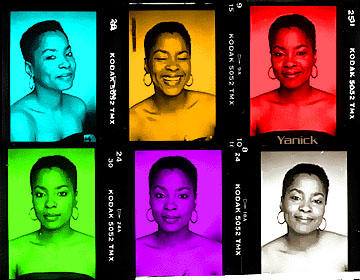
Nevertheless, I Think Of You
The end
of this chapter, and of this compilation, is a deliberate
descent into melancholy, mirroring the downward spiral of our
relationship. I find this set of songs exquisitely painful,
difficult to listen to, but creatively some of the better work
she and I have done together.
Summer Of '79 was the final incarnation of this idea. Based on
the structure for the oft-worked-on Summer of’75, I sold the
soul of this pivotal moment of my life to Yanick, refitting it
to her own experience with a tragically lost love. Yanick and I
argued bitterly over, the word “Mister,” used in an Anita
Baker-like bark somewhere in the middle of the song. This was
not recorded very well, either, and I had buzz problems with
Bryon Hankins’ bass (and kind of wished I’d have just played it
myself). I used a sequencer here to get the piano playing
straightened out, making me sound like a better player than I
actually am. Gregg’s amazing acoustic guitar work blends nicely
into a drunken, out-of-control rock frenzy in the back, which
was meant to resonate with his work on Show Me, but I drowned
him in reverb here and, oh well.
Fragile, by Derek Jackson, was a song
he’d written and produced but had no lyrics. Writing about our
shaky marriage, Yanick immediately loved the song. We again
recruited Florence for the backgrounds, a melancholy, hollow
dirge that runs throughout the song, and Gregg improvised some
wrenching, sad guitar riffs at the end. Mixing the track, I had
the song literally fall to pieces and dissolve, mirroring our
relationship.
If I Should Perish,
written in early 1993, was kind of a farewell. We both saw
the breakup coming. Perish was Hollis Stone’s last
official appearance anywhere.
I haven’t recorded since. Now, I have to assume it is more a
time consideration than a creative block, but part of me is
seriously intimidated by the whole process. Technology has
marched on and I’d have to spend endless hours learning the new
kids’ toys, all the computer wizardry that enables the new
generation to do much, much cleaner and much more dazzling
things in their basements than I ever did, and to do it in half
the time.
Driving home one evening, Yanick and I were idly chatting in her
car when her song, This Time, began playing. I reached over to
turn down the cassette when I realized there was no cassette in
the deck: the radio was playing. WBLS, New York's top R&B FM
station, was playing her, ahem, our song. I believe we kind of
shrieked like two grade-school kids, likely swerving lanes on
U.S. Highway 1 late at night (not a bright move).
It was magic time. “LANGSTON HUGHES!”
Christopher J. Priest
January 2000 UPDATED OCTOBER 2013
Home | Blog | Projects | Comics | Rants | Music | Video | Christian Site | Contact
Twynn Press Kit photos
Copyright © 1993 Grace Phonogram Entertainment.
Unless otherwise specified, Copyright © 2013 Lamercie Park. All Rights Reserved.
TOP OF PAGE


